PH-TIPP Biographies
Fabrice Czarnecki, MD, MA, MPH
Chief Medical Officer, Transportation Security Administration
Springfield, Virginia
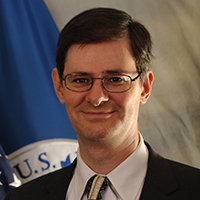
PH-TIPP Project Focus: Fabrice will evaluate the response of the Transportation Security Administration (TSA) to COVID-19, both to protect the traveling public and to protect TSA’s workforce. He will recommend updated policies and processes based on proactive reviews, scientific recommendations, public health updates, and leadership requests. He will create weekly updates on the epidemiology of COVID-19 with forecast and recommendations specific to TSA needs.
Background: Fabrice is the Chief Medical Officer for the TSA, US Department of Homeland Security. Prior to joining TSA, Fabrice was the Medical Director of Public Safety Medicine at Northwestern Medical Group in Chicago. He was a practicing emergency physician in Maryland and in Paris, France. Fabrice earned his MD degree from the Universite de Paris 5, a master’s degree in public health from the Universite de Paris 7, and a master’s degree in biochemistry and genetics from the Universite de Paris 5. He is board-certified in family medicine and emergency medicine.
Patricia Emmanuel, MD
Lewis A. Barness Professor and Chair, Department of Pediatrics
University of South Florida, Tampa, Florida
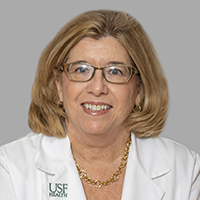
PH-TIPP Project Focus: Behavioral health concerns account for half of the top diagnoses in children cared for in primary care settings. Patricia will conduct a policy analysis of state and federal programs and best practices that promote integrated behavioral health in primary pediatric settings. She will focus on innovative payment models and workforce issues. Patricia will work to draft state policy related to enhanced payment for behavioral health integration. She will evaluate components of Florida’s Title V funded collaborative in pediatric behavioral health.
Background: Patricia serves as the Lewis A. Barness Professor and Chair of the Department of Pediatrics at the University of Southern Florida (USF) since 2012. Previously she served as USF’s Associate Dean for Clinical Research, and Chief of the Division of Pediatric Infectious Disease. The focus of her clinical and research activities has been the prevention and treatment of HIV infection in infants, children, and pregnant women. She was the medical director of a regional program that implemented family-centered care and perinatal case management to reduce mother-to-child transmission of HIV. She has participated in many national and international HIV treatment and prevention trials and spearheaded the establishment of a youth clinic that provides free sexual health treatment and prevention services to under-served youth in the Tampa area. Patricia received her BS from the University of Notre Dame and an MD from the University of Florida. She completed her pediatric residency and fellowship in infectious diseases at the University of South Florida.
Vicky Knisley-Henry, PhD
Health Educator
Miami County Public Health, Troy, Ohio
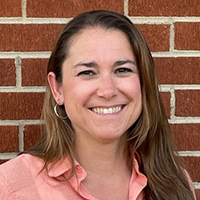
PH-TIPP Project Focus: By applying CDC Policy Analytical Framework, Vicky will conduct policy analysis of population-wide heart disease prevention, described in A Public Health Action Plan to Prevent Heart Disease and Stroke, and assess the impact of and how policies are translated into the local public health level. This will allow for strategic adjustments in policy facilitation. Additionally, Vicky will conduct a formal evaluation, based on the CDC’s Framework for Program Evaluation in Public Health, of Miami County Public Health’s Health Education programs that target the education and reduction of heart disease prevalence.
Background: At Miami County Public Health, Vicky works as a Health Educator where she specializes in creating and implementing programs that target chronic disease, healthy eating, physical activity, and traffic safety. During her time as a Health Educator, she has created a community clean-up and mobile tool shed program, an agency employee health and wellness program, and a community wellness program. Vicky is also a contributing creator of the agency strategic plan and the community health improvement plan. Vicky earned her PhD in Public Health from Walden University. Her doctoral research was on the impact of exposure to the chemical pesticide chlorpyrifos on colorectal cancer incidence in agricultural communities in Ohio.
Prashanthinie (Prashi) Mohan, DrPH, MBA
Internal Consultant
Children’s Hospital of Orange County, Orange, California

PH-TIPP Project Focus: Currently, one in four youth has a chronic health condition and 90% of them are expected to survive into adulthood and transfer from pediatric care to adult care. Children’s Hospital of Orange County (CHOC) is embarking on a comprehensive, hospital-wide program focused on adolescent to adult transitions. As part of this fellowship, Prashi will research existing literature, best practices used nationally by various children’s hospitals, expertise from Got Transition, and costs and outcomes from CHOC’s pilot programs to identify outcome measures for seamless adult care and recommend reimbursement policies and best practices for conducting health equity assessment focused on transition services.
Background: Prashi has over 15 years of experience in the healthcare industry. She started her healthcare career by consulting with hospitals on various labor optimization, data analytics, and process improvement initiatives. While pursuing her doctoral degree, Prashi worked on multiple research studies, policy briefs, and projects focused on improving care outcomes while optimizing healthcare utilization and costs. She currently works with CHOC’s Strategy Planning team where she combines her research, population health, and consulting experience to identify evidence-based strategies for pediatric providers. Prashi earned a Doctor of Public Health with a focus on Health Policy & Management. She also holds an MBA with a major in Finance and a Management Accountant Certification.
José T. Montero, MD, MHCDS
Director, Center for State, Tribal, Local, and Territorial Support
Centers for Disease Control and Prevention, Atlanta, Georgia

PH-TIPP Project Focus: José will improve the understanding of facilitators and barriers that CDC-funded recipients experience in partnering with community-based organizations as they engage in health equity and social determinants of health of work. He will work on understanding barriers and facilitation mechanisms for the adoption and use of tools designed to assess health equity readiness and progress.
Background: For the past 6 years, José has led the team at the Center for State, Tribal, Local, and Territorial Support (CSTLTS) at CDC where they work to enhance public health systems to help agencies deliver high-quality services to the people and communities they serve. CSTLTS collaborates with partners to strengthen public health services, build a diverse, expert public health workforce, and promote evidence-based practices. CSTLTS is also purposefully focused on addressing health disparities to advance health equity, joining with all of CDC to integrate health equity into the fabric of the agency’s work. José holds an MD from the Universidad Nacional de Colombia. He earned a Specialist in Family Medicine from the Universidad del Valle in Cali, Colombia, and an epidemiology degree from Universidad Javeriana in Bogotá, Colombia. José received his certification of field epidemiology from the Colombia Field Epidemiology Training Program, and a Master of Healthcare Delivery Science from Dartmouth College.
Vlad Schorstein, MD, MPH
Integration Coordinator, Division of Health Protection
Georgia Department of Public Health, Atlanta, Georgia

PH-TIPP Project Focus: Vlad will conduct a needs assessment and policy analysis to leverage existing resources to increase Georgia healthcare providers’ access to electronic health records (EHR) capability with built-in integrated prescription drug monitoring program (PDMP) access to facilitate clinical workflow and improve patient outcomes.
Background: Vlad leads the statewide PDMP Integration effort, which is part of Georgia’s Opioid and Substance Misuse Program, an initiative funded by the CDC’s Overdose Data to Action (OD2A) grant. Integration of PDMP access into EHRs and pharmacy management systems enhances patient care and minimizes time burden associated with PDMP querying. Vlad also leads the quarterly prescriber report program, which has become an invaluable tool in improving the clinical decision-making process of providers who prescribe controlled substances. Vlad earned a BS in Biology from Oglethorpe University in Atlanta. He subsequently earned an MD from Spartan Health Sciences University School of Medicine in St. Lucia, West Indies, and an MPH from Mercer University in Atlanta.
Samareen Shami, BSc, MA, MPH
Project Manager, Population Health
Health Plan of San Mateo, California

PH-TIPP Project Focus: Samareen hopes to enhance her policy development and program evaluation skills to create a stronger culture of health outcomes-based analysis at a managed care organization. Samareen also hopes to utilize data analysis to understand the current burden of “Long COVID” on the healthcare system in San Mateo County and identify ways to improve both the diagnosis and management of the condition through investigating current patterns of diagnosis, understanding existing policy, and addressing any identified gaps.
Background: Samareen works in the managed care space, developing and managing programs in a variety of areas for special populations of focus including the perinatal population, children, teens, older adults, and persons with disabilities. In her current role, Samareen is responsible for directing the strategy for her population health department through data driven analysis with the aim of incorporating an understanding of social determinants of health and health inequities. Samareen earned a Master of Public Health from the University of California in Berkeley with a focus on Health Policy and Management.
Isaac Benowitz, MD
State Epidemiologist
Maine Department of Health and Human Services, Augusta, ME
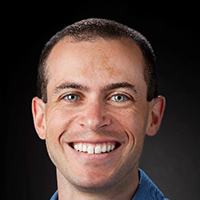
PH-TIPP Project Focus: Build Maine’s program for COVID-19 outpatient treatment in partnership with health systems, hospitals, clinics, and pharmacies, addressing geography, equity, and access; improve public awareness of treatment; improve healthcare personnel comfort in prescribing outpatient treatment.
Background: Dr. Isaac Benowitz is the State Epidemiologist at the Maine CDC, where he provides epidemiological expertise, guidance, and support on disease investigations, outbreak control, surveillance activities, and planned epidemiologic studies. He leads Maine’s COVID-19 therapeutics program. Before joining Maine CDC in 2021, he worked for CDC with a focus on communicable disease outbreaks and healthcare-associated infections. He is a graduate of Columbia University and the Yale School of Medicine. He completed pediatric residency training at the Massachusetts General Hospital and also completed applied epidemiology training as an Epidemic Intelligence Service officer assigned to the New York City health department.
Jeremy J. Blanchard, MD, MPH
Physician
University of Washington Boise Addiction Medicine Program, Boise, Idaho

PH-TIPP Project Focus: Conduct policy analysis of opioid prescription limits described in the Comprehensive Addiction and Recovery Act 2.0 and assess impact of dedicated treatment courts on rates of recidivism and clinical abstinence
Background: Jeremy attended Lee University where he obtained degrees in Biochemistry and English. During his studies he worked on NASA-funded research studying the effects of microgravity on bone loss in astronauts. He then obtained an MPH at Yale University focusing on the epidemiology of microbial diseases. While there he focused on the attenuation of influenza transmission as well as research funded by USAID assessing emerging pandemic threats. Jeremy attended medical school at the James H. Quillen College of Medicine at East Tennessee State University. He then started his career in General Surgery residency at the University of Maryland Medical Center before switching to Family Medicine at the same institution to facilitate his broad clinical and research interests and serve as chief resident. He is heavily involved in research and is completing his PhD in Population Health at Thomas Jefferson University in Applied Health Economics and Outcomes Research. His research interests include health economics, infectious disease modeling, and economic mobility. His clinical interests include addiction medicine, HIV/AIDS, viral hepatitis, women’s health, and maternal and child health. As a physician scientist, Dr. Blanchard is passionate about bridging the gap between health economic research and durable, salient policy.
Nikia D. Braxton-Franklin, MPH
Alcohol and Other Drug Prevention Specialist
Oregon State University

PH-TIPP Project Focus: Explore Cannabis education from a social justice lens by addressing the inequities associated with the use of the term Marijuana for those within the BIPOC community.
Background: Nikia is a seasoned public health professional with extensive experience mobilizing, educating, and capacity-building within underserved communities. She works with populations engaging in risky behaviors by designing, implementing, and evaluating behavioral interventions for universities, health departments, and CBO’s at the local, state, national, and international level. Nikia served as the Associate Director of Research at Emory on several multi-level randomized controlled behavioral trials funded by CDC, NIH and NIMH. The goal was to test the efficacy of HIV prevention programs tailored for diverse populations. She was integral in training the curricula listed within the CDC’s compendium of EBI’s (SISTA, SIHLE, WILLOW, AMIGAS, Horizons, and Eban). Nikia has co-authored several publications, book chapters, and has presented her research at national conferences. In her current faculty position at OSU, she serves as the Alcohol and Other Drug Prevention Specialist.
Didi Ebert, DO, MPH, MS, CPPS
Associate Professor, Department of Family Medicine and Osteopathic Manipulative Medicine
The University of North Texas Health Science Center at Fort Worth – Texas College of Osteopathic Medicine
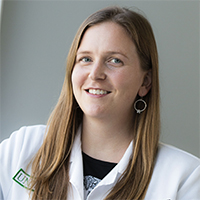
PH-TIPP Project Focus: Demonstrate a financially sustainable model of team-based, learner-integrated primary care that leverages social determinants of health data to align clinical practice with public health.
Background: At the Health Science Center at Fort Worth – Texas College of Osteopathic Medicine, Didi specializes in family medicine, clinical education, public health, as well as patient safety and quality improvement. Her team strives to achieve the Quadruple Aim and prove that health profession learners are an important part of achieving that aim. She has collaboratively developed a “value-add,” task-based curriculum that aligns the work of interprofessional learners with patient care tasks appropriate to their competency level and scope of practice; a current example is the learner-led collection of social determinants of health in clinics. Simultaneously, she championed the growth of an ambulatory care pharmacy collaborative practice within family medicine, leading to improved quality of care and closing gaps in population health measures. Her team’s aim is to create a community-oriented primary care and whole health model that addresses social determinants of health to advance health equity.
Joel Fulkerson, DO, MPH, MBA
Senior medical officer
USCG Base Alameda, CA

PH-TIPP Project Focus: “To modernize the USCG’s clinical staffing models in support of operational medicine needs and to update the USCG’s hyperbaric dive medical policies.”
Background: After working as a commercial pilot and flight instructor, Joel decided to make a career change by taking a Navy scholarship to go to medical school. Since graduating, his work has been focused on operational medicine in direct support of the country’s warfighters. Joel has served as the flight surgeon for the Navy’s prestigious TOP GUN program, the medical director of a Navy Search and Rescue (SAR) squadron, and the group surgeon for the largest Marine Aircraft Group in the country. His residency was in aerospace/occupational medicine, where he focused on decompression sickness events in F-18 crew members. Currently, he works with the US Coast Guard as a USPHS officer. In the future, Joel hopes to pursue his passion for boots-on-the-ground, front-line, investigative medicine as an epidemiologist and disease outbreak scientist.
Phuoc Anh “Anne” Nguyen, PharmD, MS, BCPS
Pharmacy Manager
Houston Methodist West Hospital, Houston, Texas

PH-TIPP Project Focus: Leveraging technology innovations, develop recommendations, and workflow processes to reduce 30-day readmissions for heart failure patients in a community hospital.
Background: Anne is the current Pharmacy Manager at the Houston Methodist West Hospital. Raised in Houston, Texas, she received her bachelor’s degree in Biology and Doctor of Pharmacy degree at the University of Texas at Austin. She completed a combined Health-System Pharmacy Administration Residency at the Michael E. DeBakey VA Medical Center with a Master of Science in Health Outcomes and Policy at the University of Houston College of Pharmacy. She is a passionate and visionary pharmacy leader with a genuine understanding of various pharmacy settings (community independent pharmacy, hospital pharmacy, and academia). Her professional interests include care coordination, population health, medical writing, and digital health innovation. In her free time, she is a career coach and the host of the Money and Mindset YouTube show to mindfully empower leaders to win in their career journey and financial health.
Heidi Overton, MD
Director, Center for a Healthy America at the America First Policy Institute
Washington, D.C.

PH-TIPP Project Focus: Utilize data analysis and evaluation frameworks to understand the impact of recent federal policies in telehealth deregulation and hospital price transparency and develop evidence-based policy strategies to address any identified gaps.
Background: Heidi is from Gallup, New Mexico and currently works as the Director of the Center for a Healthy America at the America First Policy Institute. She recently served as a White House Fellow in 2019-2020 in both the Office of American Innovation and the Domestic Policy Council. Heidi is a PhD candidate in Clinical Investigation at the Johns Hopkins University Bloomberg School of Public Health where she studies clinician behavior change in post-operative opioid prescribing. She was previously a general surgery resident at the Johns Hopkins University School of Medicine and has been a physician advocate for price and quality transparency in healthcare. During medical school, she was appointed to the University of New Mexico (UNM) Board of Regents and had fiduciary and full-voting responsibilities for all business and clinical operations of the university and health system. She received her undergraduate and medical degrees from UNM’s Combined BA/MD Program.
Makeda Vanderpuije, MPH CPH
Public Health Analyst
Office of Health Equity, District of Colombia Department of Health, Washington, DC

PH-TIPP Project Focus: Conduct a comprehensive evaluation of a collaborative, cross-sector initiative to ensure stable housing for birthing people, and evaluate the potential impact of a shareholder-engaged effort to develop a common definition for housing insecurity.
Background: Makeda is a public health analyst with the District of Columbia Office of Health Equity. She operationalizes equity practice through community engagement, cross-sector partnership building, and strategic collaborative action to address the root causes of health disparities. Her passion for health equity stems from working with older adults through a local federally qualified health center as a teen. She has since worked on projects across the spectrum of public health practice, including: research supporting young parents through mentorship, facilitating the integration of behavioral health services into pediatric primary care, promoting socioemotional health of young children, and engaging shareholders in community health improvement. At the University of Pittsburgh, she earned her undergraduate degree in Urban Studies with a certificate in Managing Health Services Programs and Projects and earned her Master of Public Health.
Adam Barefoot DMD, MPH
Director of Oral Health
Georgia Department of Public Health, Atlanta, GA

PH-TIPP Project Focus: Develop guidelines and recommendations for implementing school sealant programs in Georgia and the evaluation of a GDPH program that provides oral health pregnancy resource bags for new mothers.
Background: Adam is a Georgia licensed dentist and the Director of Oral Health for the Georgia Department of Public Health. In his current role, Adam leads the State Oral Health Program to help reduce oral health disparities and improve oral health outcomes across the state. This is done through many programmatic activities including supporting 18 public health district oral health programs, providing technical training to community water fluoridation operators, promoting and implementing school based oral health prevention programs, conducting statewide oral health surveillance, and partnering with a variety of organizations in cross cutting activities and initiatives. Previously, Adam was the Dental Director for a Federally Qualified Health Center serving primarily underserved and uninsured rural populations. This experience provided significant insight into health disparities and health inequity issues. During this time, he completed an MPH degree program. He also completed a one-year general practice residency program in a hospital-based setting in Pittsburgh, Pennsylvania prior to starting a clinical career in private practice. Adam currently sits as a Board member for the Association of State and Territorial Dental Directors as well as the Georgia Oral Health Coalition.
Srimoyee (Sri) Bose, PhD, MA
Economic Analyst
Utah Department of Health, Salt Lake City, UT

PH-TIPP Project Focus: Augment Prevention Effectiveness Fellowship experiences by building leadership and management skills, stakeholder engagement, and designing, launching, and assessing community need programs.
Background: Sri earned her Master’s in Economics and PhD in Resource Economics from West Virginia University. Sri has experience in leading and coordinating economics, cost-effectiveness analysis, intervention, and policy evaluation of public health programs in India and the United States of America. She demonstrated success through working in multiple competing timelines and projects in Utah that include economic evaluation of elevated blood lead level, return on investment (ROI) of progesterone use among Medicaid women with preterm birth, cost and benefit analysis of tobacco disparity network, ROI of a centralized food handling system, cost analysis of baby watch early intervention, and more. She collaborated with a team of fellows for successful execution of the CDC Population Health Workforce Initiative pilot project on Medicaid Super Utilizers in Utah. She is proficient in analyzing and interpreting data, providing recommendations for policy interventions, and effectively communicating scientific work to various audiences and stakeholders.
Richard C. Calderone, DO, MPH
Faculty Physician
Forrest General Hospital Family Medicine Residency Program, Hattiesburg, MS
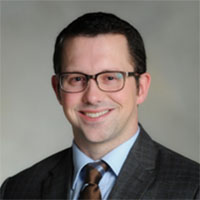
PT-TIPP Project Focus: Develop and direct an Internal Medicine Preoperative Assessment, Consultant, and Treatment Clinic for a county-owned hospital by utilizing a multi-disciplinary healthcare team to optimize the perioperative experience. Specific goals of the project are to improve quantifiable patient outcomes, resource utilization, and patient satisfaction for this service line.
Background: Richard is a National Health Service Corps scholar trained in the medical specialties of Internal Medicine and Pediatrics, with additional qualifications in hypertension and HIV Medicine. As a medical educator, he teaches medical students and resident physicians in multiple settings, incorporating simulation medicine and other technology-driven learning modalities. He has a passion for providing care to underserved communities and for advocating policies to improve their quality of life.
Angela Cummings, DrPH, MSPH, MEd
Assistant Professor
Baylor College of Medicine, Houston, TX

PH-TIPP Project Focus: Build policy analysis abilities and program evaluation skills with the Plan of Safe Care (POSC) project.
Background: Angela earned a DrPH in Community Health Practice from The University of Texas Health Science Center at Houston – School of Public Health. After starting a career as an elementary and middle school teacher, her real world observation of the social drivers of health led her to study public health. Angela’s broad professional interests include social and economic drivers of health, health disparities, maternal and child health, and global health. Through her previous work at a state public health agency and currently as an assistant professor, she has had the privilege to work on a broad range of projects from implementation of community-based educational interventions to the evaluation of state-wide policy change.
Hilary Gillette-Walch, RN, MPH, CPH
Clinical Decision Quality Manager
Central California Alliance for Health, Scotts Valley, CA

PH-TIPP Project Focus: Explore different population health frameworks and develop a population health program that will meet the needs of our members.
Background: Hilary spent the first two decades of her career in local and state public health departments providing nursing and epidemiologic support in areas including administration, communicable disease, sexually transmitted diseases, HIV, maternal child health, oral health, chronic disease prevention, and preparedness activities. Her passion is for vaccines and vaccine-preventable disease epidemiology. Hilary has had the opportunity to lead outbreak investigations for Hepatitis A, E.Coli, pertussis, varicella, and other conditions. Now, Hilary is working for a Medicaid managed care plan and while working in Quality Improvement to continue utilizing her clinical and analytical skills for program development and to inform policy. She currently leads the Data Workgroup for the California HPV Vaccination Roundtable.
Melissa Reyes, MD, MPH
Medical Officer
Food and Drug Administration
Center for Drug Evaluation and Research, Silver Springs, MD

PH-TIPP Focus: Expand leadership and managerial skills through formal training and execution of population health projects related to post market drug safety.
Background: Melissa serves as a Commissioned Corps Officer in the United States Public Health Service, working for the Food and Drug Administration as a regulatory physician. She is boarded in dermatology and pediatric dermatology and provides subject matter expertise related to the development of drugs for the treatment of cutaneous disorders and adverse drug reactions of the skin. Her interests including ensuring that safe and effective drugs are available for patients with dermatologic conditions and that healthcare providers have evidence-based, up-to-date drug information to facilitate the care of patients.
Jennifer Romaszewski, BDS, MPH, ABDPH
Health Planner/Trainer
Denton County Public Health Department, Denton, Texas

PH-TIPP Project Focus: Enhance competency in systematic program evaluation and policy development methods to strengthen continuous quality improvement and workforce development at the local health department level.
Background: Jennifer earned her BDS at Poznan University of Medical Sciences and MPH at Loma Linda University. While completing her dental public health Residency at the State of North Carolina, she designed and conducted population-based research studies to answer public health questions. Jennifer conducted a statewide survey of residents in assisted living facilities and contributed to the development of a statewide oral health surveillance written plan. Since working for Denton County Public Health and leading integration efforts of the dental services program with correctional health staff and providers within the department, Jennifer was responsible for facilitating the use of health IT and the exchange of health information. In her current role, she is responsible for identifying and evaluating workforce development and training needs along with leading quality improvement and accreditation efforts. Jennifer participates in developing, analyzing, and translating key performance indicators against established targets and goals and transforms those into reportable data and various plans to guide department-wide efforts to achieve positive health outcomes.
Julie F Sergeant, MSEd, PhD
Director, Population Health Strategies Section
Director, Kansas Behavioral Risk Factor Surveillance System (BRFSS)
Kansas Department of Health and Environment, Topeka, Kansas

PH-TIPP Focus: Gain policy and evaluation skills and strategies for addressing social determinants of health within population health initiatives at the state level.
Background: Julie served as Director and Manager of multiple population health programs at Kansas Department of Health and Environment. She currently works on strategic planning for chronic disease and injury programs and directs the Kansas Behavioral Risk Factor Surveillance System. Julie previously managed public health programs related to early detection of breast and cervical cancer, comprehensive cancer control, cancer survivorship, arthritis, injury, disability, opioid misuse, and palliative care. Julie’s 20+ years of public health experience also include work as a public health educator and as a Peace Corps volunteer in a rural public health district in the Democratic Republic of the Congo. She worked in academia on research and evaluation projects on gerontology, disability, and Medicaid long-term care programs. Throughout her career, she has been interested in quality of life, health equity, life transitions, and their role in health status.
Kristi Anderson, MD, MPH, FACOG
Senior Medical Officer
CDC World Trade Center Health Program, Atlanta, GA
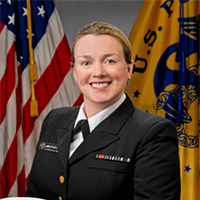
PH-TIPP Project Focus: Develop additional analytical and leadership skills within policy development and program evaluation, ultimately cultivating expertise to apply innovative programmatic efforts aimed at promoting optimal patient care coordination.
Background: Kristi served as a Commissioned Corps Officer in the United States Public Health Service, working for the Indian Health Service in New Mexico as an OB/GYN. She provided quality clinical care in a low resource environment. She championed numerous initiatives aimed at improving pregnancy and neonatal outcomes in patients with high risk pregnancies complicated by obesity and diabetes. She helped standardize regional care practices and increased access to quality and healthy food choices. As a Senior Medical Officer for the World Trade Center Health Program, Kristi oversaw a nationwide health plan serving over 90,000 enrollees. She also provided subject matter expertise on medical and pharmaceutical benefit eligibility and treatment authorization. She developed comprehensive policies framed within legal authority to enhance value-based care and improve patient outcomes and satisfaction in the setting of complex clinical and social scenarios.
Rodrigo Karlop Arce Cardozo, MD, MPH, CCRP
Project Manager
Population Health Department, New York University School of Medicine, New York, NY
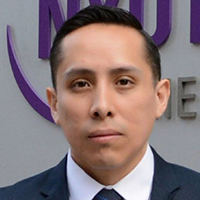
PH-TIPP Project Focus: Develop and implement a Population Health PhD Training Program (PHP) within New York University School of Medicine. Evaluate Data Medicine and Health Cluster doctoral program: epidemiology, biostatistics, and population health.
Background: Rodrigo focused his work on clinical research, public health, and healthcare education. He served as Project Manager for the New York University School of Medicine, managing several educational programs including their Epidemiology and Biostatistics doctoral programs, and multiple other projects in population health research. He was appointed as an Adjunct Assistant Professor at City University of New York-Hunter College School of Urban Public Health.
Tiffany M. Jones, DrPH
Senior Research and Evaluation Specialist
Karna LLC, Atlanta, GA
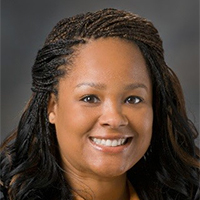
PH-TIPP Project Focus: Influence policy through stakeholder engagement and evaluate community education and outreach programs.
Background: Tiffany worked to understand why individuals make certain choices regarding their health. She examined the costs of cancer care, how patients understand outcomes and health information, and supported multiple government agencies in program evaluation, assessments, analysis, and reporting. Tiffany gained the opportunity to work with commercial clients, including a large insurer and a major health system, to evaluate their community-based programs and recommend policies for expanding their population health projects.
Arianna Keil, MD
Quality Improvement Director
Children’s Health Alliance of Wisconsin
Wisconsin Department of Health Services’ Family Health Section, Madison Wisconsin

PH-TIPP Project Focus: Strengthen a statewide child health quality collaborative informed by public health priorities
Background: Arianna served as Quality Improvement (QI) Director for Children’s Health Alliance of Wisconsin, in collaboration with the WI Department of Health Services’ Family Health Section. She advised the planning and execution of program improvement efforts, acting as an expert consultant on improvement science and data-driven decision making, and building organizational capacity in QI methods and team facilitation. Arianna led multiple public health projects to advance child health, including statewide physician and efforts of care team member to promote early identification of children with developmental delays, mental health integration into pediatric primary care, and shared care planning for children with chronic conditions.
Alice Kuo, MD, PhD, MBA
Professor
Los Angeles County Department of Public Health, Los Angeles, California

PH-TIPP Project Focus: Gain experience in program development and evaluation to increase Child Health Policy skills.
Background: Alice earned double-boards in internal medicine and pediatrics in Los Angeles. Alice served as president of the Southern California chapter of the American Academy of Pediatrics (AAP) and authored or co-authored ten policy statements for the AAP on social determinants of child health. Alice worked in vaccine advocacy in the state of California, building systems of early childhood developmental services, and addressing teenage vaping. Alice also worked to develop committees on immigrant health and adverse childhood experiences (ACEs).
Mark Lamb, MSN, MPH, FNP-C, ENP-C
Nurse Practitioner
Chinle Comprehensive Healthcare – Indian Health Services, Chinle Arizona

PH-TIPP Project Focus: Design and implement a quality improvement project evaluating the health-seeking behaviors of Navajo patients seen in Chinle Comprehensive Health Center’s (CCHC) Emergency Department/Urgent Care (ED/UC) in order to better accommodate how patients utilize our health system.
Background: Mark served as a nurse practitioner in the Emergency Department/Urgent Care on the Navajo Reservation. He used his clinical experience in emergency medicine, community health, care management, nursing, global health, mental health, critical care, and inpatient/outpatient care. Mark evaluated the integrated behavior health program at a health center serving Atlanta’s uninsured and homeless population. He also developed a survey evaluating the perceptions of mental illness amongst traditional healers in Karnataka, India. Mark also worked to perform a community needs assessment of mental health of university students and evaluated perceptions of sexual violence amongst graduate students.
Teresa Pfaff, MPH, MSN, RN, APHN-BC, CPH
Director, Babies Born Healthy
Baltimore County Health Department
Division of Prenatal and Early Childhood Programs

PH-TIPP Project Focus: Expand and enhance knowledge of program evaluation and policy development methods to strengthen maternal child health care coordination and navigation programming at the local health department level.
Background: Teresa practiced as a public health nurse with over 10 years of public health experience in program development, implementation, evaluation, knowledge management, and strategic planning and research in resource-limited settings.
Judith M. Policicchio, DNP, MS, MPA
Clinical Instructor
University of Michigan School of Nursing Undergraduate Studies, Ann Arbor, Michigan
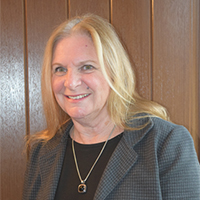
PH-TIPP Project Focus: Develop the knowledge and skills required to plan and implement population health projects while enhancing the ability to conduct program and policy evaluation.
Background: Judith’s projects focused on teaching nurses in southeastern Michigan about the care and management of asthma, and teaching community health workers on an American Indian Reservation about the care and management of diabetes. Judith joined the clinical faculty at the School of Nursing at the University of Michigan where her work was instrumental in developing a Memorandum of Understanding (MOU) between Detroit Public School Community District (DPSCD) and the University of Michigan School of Nursing. This MOU enabled Judith to collaborate with the social work community to develop an interdisciplinary team including nursing, social work, kinesiology, and medicine. Judith collaborated with local community agencies to begin to address the effects of poverty in the students of DPSCD schools and their families.
Puthiery Va, DO, MSc
Population Health Director
Division of Public Health for Chinle Services Unit Population Health Department

PH-TIPP Project Focus: Gain skills to support the role as Population Health Director for the Chinle Service Unit focused on population health, program evaluation, and policy development.
Background: Puthiery trained in internal medicine at Jacobi Medical Center, a public hospital in the Bronx. She served an underserved population with a disproportionate burden of disease and excess mortality. Her experience with this unique patient population underscored the interconnectedness of health and access, history, socioeconomic factors, and social circumstance. She focused on primary care prevention and chronic disease self-management. As an EIS officer assigned to the Division of Heart Disease and Stroke Prevention, she systematically evaluated sodium surveillance in a U.S. population using the National Health and Nutrition Examination survey. She evaluated dietary behaviors and cardiovascular outcomes and led a multiagency collaborative project between the Centers for Disease Control and Prevention, United States Department of Agriculture, National Cancer Institute, and the National Heart, Lung, and Blood Institute to evaluate measurement error in 24-hour dietary recall for assessing sodium and potassium intake among US adults. Puthiery’s EIS training provided her with the opportunity to participate in a mumps outbreak investigation and event-based surveillance surrounding Zika Virus spread in the Americas.
Benjamin Kaplan, MD, MPH, FACP
Internal Medicine Clerkship Director
Orlando Health Internal Medicine Faculty Practice
Clinical Assistant Professor
Florida State University College of Medicine, Orlando Campus
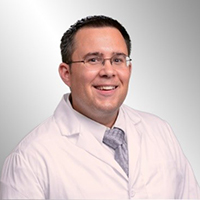
PH-TIPP Project Focus: Explore new ways and strengthen current efforts to develop and implement patient care coordination policy, workflows, and strategies to achieve quality metrics for defined patient populations.
Background: Benjamin, alongside a team of colleagues in the Population Health Department at Orlando Health, planned and implemented new methods and reinforce current strategies that focus on quality reporting and outcomes. He managed the implementation and operation of the shared medical appointments program, where he used population health management systems along with quality metric dashboards to assimilate and document the outcomes of patients that use shared medical appointments.
Susan A. Lippold, MD, MPH
Medical Director
CDC Occupational Health Clinic, Atlanta, GA
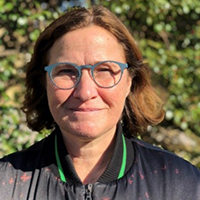
PH-TIPP Project Focus: Gain an applied understanding of population health interventions with a focus on developing leadership and management skills related to policy development and analysis and program evaluation.
Background: During her career as a Commissioned Corps officer in the United States Public Health Service, Susan worked for the Indian Health Service (NM, AZ), Health Resources Services Administration (IL), and the Centers for Disease Control and Prevention (IL, GA). She gained experience in chronic disease, infectious disease, emerging infectious disease, deployment, and outbreak investigations and was involved in CDC’s Ebola, MERS-CoV, Zika virus, and hurricanes Irene, Issac, Sandy, responses. Susan also worked as a Medical Director for the City of Chicago’s Tuberculosis Control Program for six years.
Monica Livengood, MPH, BSN, RN, CHES, CPH
National Director of Nursing
AbsoluteCare, Atlanta, GA

PH-TIPP Project Focus: Expand knowledge of effectively applying program evaluation methods to thoroughly identify opportunities for process improvement of a comprehensive, biopsychosocial home health program.
Background: Monica worked in a variety of inpatient and outpatient settings that emphasized high quality care for vulnerable populations. She worked for the Florida Department of Health, Central Office, in the Division of Communicable Diseases. As a nurse consultant, she gained valuable experience with clinical compliance monitoring; development of program guidelines and policies; and process improvement.
Christina Mikosz, MD, MPH, FACP
Medical Officer
Division of Unintentional Injury Prevention, CDC

PH-TIPP Project Focus: Strengthen skills in policy development and program evaluation to create actionable tools that assist health systems in creating achievable plans to address opioid overprescribing and overdose.
Background: Christina participated in the CDC Experience fellowship, spending a year working at CDC in the Division of Viral Rickettsial Diseases. During her internal medicine residency at University of California San Francisco (UCSF), she researched preventable characteristics among city tuberculosis (TB)-related deaths. After spending some time working as a hospitalist at UCSF, she spent two years as an EIS officer assigned to Los Angeles County, and then worked as the TB medical consultant and acting TB controller for the Alameda County Public Health Department.
Alison Ridpath, MD, MPH
Medical Officer
LCDR, U.S. Public Health Service
Division of STD Prevention, CDC
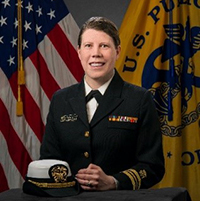
PH-TIPP Project: Evaluate the Division of STD Prevention’s STD Outbreak Response and Coordination Effort.
Background: In 2017, the Division of STD Prevention established a division-wide collaboration effort to respond to requests for technical assistance related to STD outbreaks or clusters. As the Division of STD Prevention’s Outbreak Response and Coordination Effort lead, Alison evaluated the group’s activities to identify gaps and barriers related to prior technical assistance and make recommendations to improve future responses. Her evaluation assisted the division to provide more effective and efficient assistance in the future.
Arvelo Wences, MD, MSc
Preventive Medicine Residency and Fellowship
Division of Scientific Education and Professional Development, CDC

Learning goal for the year: Augment his work management and leadership capacity with a focus on building my program evaluation and policy development skills.
Background: Wences currently works at CDC as a team leader for the Evaluation, Reporting, Selection, and Analysis Team supporting several workforce fellowships at CDC, including the Epidemic Intelligence Service (EIS). Previously, Wences was stationed overseas as the Resident Advisor to the Kenya Field Epidemiology Training Program from 2011–2015, and as the lead medical epidemiologist for the International Emerging Infections Program in Guatemala from 2007–2011. Wences received his medical doctorate from the University of Puerto Rico, a Masters in Science from the London School of Hygiene & Tropical Medicine, and trained as an internal medicine physician at Boston Medical Center in Massachusetts, and as an EIS officer assigned to the CDC’s Enteric Diseases and Epidemiology Branch.
Leo Ndiangang Achembong, BDS, MPH
Health IT Policy Project Manager
Center for Health Policy and Performance, Texas Department of State Health Services, Austin, Texas
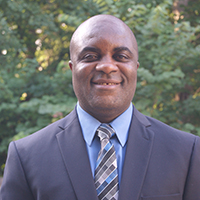
PH-TIPP Project: Advance Interoperability between Texas Health and Human Services Agencies. As a directive from the Texas state legislature, agencies within Texas’s Health and Human Services (HHS) are developing plans to more efficiently link their health information systems. This will allow stakeholders to exchange the data between systems and use it to improve health care services, manage costs, facilitate research, and protect the public from health risks. As the plans are developed, the Texas HHS agencies must draft and share reports for the state legislature to share the progress of their efforts to advance the interoperability of health information systems.
Dr. Achembong’s role in this project consists of collaborating with stakeholders to determine recommendations for changes to existing Texas HHS policies, practices, and infrastructure to enhance interoperability efforts and plan for further adoptions of data standards. He coordinates subcommittee activities, researches and prepares subject material, contributing to a work plan, and preparing text.
Appathurai Balamurugan, MD, DrPH, MPH
State Chronic Disease Director
Medical Director, Chronic Disease Branch
Associate Director for Science, Center for Health Advancement, Little Rock, Arkansas

PH-TIPP Project Focus: Evaluate the Arkansas Department of Health’s Quality Improvement Plan for Hypertension. In early 2016, the Arkansas Department of Health’s (ADH) began to implement strategies to address hypertension throughout the state. The ADH established a work group for this task. The workgroup identified major objectives to increase identification, education, and referral of residents with high blood pressure through a team-based care approach.
As the State Chronic Disease Director and Medical Director for the Chronic Disease Branch at the Arkansas Department of Health, Dr. Balamurugan will evaluate the strategic plan and assess the progress made to date, identify gaps and barriers for strategy implementation, and make recommendations to achieve success. His evaluation will assist the ADH in its efforts to mitigate the burden of hypertension and its associated costs to the state.
Michelle Chevalier, MD, MPH
LCDR, U.S. Public Health Service
Medical Officer
Division of Global HIV/TB, CDC, Atlanta, Georgia

PH-TIPP Project Focus: Develop CDC PEPFAR guidance on blood safety initiatives. The President’s Emergency Plan for AIDS Relief (PEPFAR) guidance for international blood safety programs calls for the eventual transition of funding for local blood safety programs from PEPFAR to local ministries of health (MOH) in PEPFAR countries. In order to successfully navigate this transition, it is important that CDC country offices build the capacity of local governments so that CDC and MOH country investments continue to support PEPFAR and WHO blood safety targets. A successful transition relies upon having a coordinated and comprehensive transitional plan that is supported by U.S. governmental policy.
Dr. Chevalier is working to develop a policy for the transition of funds for blood safety programs within PEPFAR countries. She coordinates with key stakeholders in strategic planning meetings to draft blood safety transition planning guidance and presents best practices to the field staff, national blood transfusion services, and CDC country offices of PEPFAR priority countries.
Bruce Doblin, MD, MPH
Founder and Medical Director
Attuned Health, Chicago, Illinois
PH-TIPP Project Focus: Understanding the Medical Needs of Older Supportive Living Residents. During the transition some older adults make from their homes to a supportive living facility (SLF), their relationships with their medical care team are often severed. Continuity of care is critical for effective and well-coordinated medical care among this population; the trust that has been developed between these patients and their care providers has been linked to positive health outcomes.
Dr. Doblin, medical director of Attuned Health, will study the circumstances that require older adults to transition from their own medical care team to SLFs. He will also perform a policy analysis to review the medical care needs of SLF residents and develop interventions to avoid complex medical care transitions and allow older adults to receive their care at home.
Jennifer Faith, PhD, RD
Epidemiologist
Deschutes County Health Services, Portland, Oregon

PH-TIPP Project Focus: Identify Potential Policy Solutions for Perinatal Care Continuum Screening and Referral. Central Oregon has developed a regional approach to a perinatal care continuum (PCC) model. This approach laid the groundwork for a referral system for pregnant women that includes nurse home visiting services, community resources, and maternal mental health programs, among others. This approach seeks to link pregnant women to needed resources, ultimately increasing the proportion of pregnant women who receive prenatal care in the first trimester, promote healthy behaviors during pregnancy, and reduce the prevalence of low birth weight among live-born infants in Central Oregon.
In collaboration with regional PCC staff and partners, Dr. Faith will develop an evaluation plan for Central Oregon’s PCC model using population-level data on timing of prenatal care, maternal and infant health outcomes, behaviors during pregnancy, costs, and client/partner satisfaction.
Sandra Leonard, DNP, RN, FNP
Health Education Specialist and Program Consultant
Division of Adolescent and School Health, CDC, Atlanta, Georgia

PH-TIPP Project Focus: Condom Availability Programs in Schools. Condom availability programs (CAPs) have been implemented in high schools since the early 1990s as one of many strategies to reduce the transmission of HIV and other STIs and unintended teenage pregnancy. These programs make condoms available to students in places like the school nurse office, school-based health centers, classrooms, and vending machines. Over the course of the last few decades, there has been public debate over whether CAPs are effective in preventing negative outcomes and whether or not they cause negative consequences by promoting sexual activity among adolescents. This underscores the need to assess the policies that support CAPS and evaluate the current attributes of CAPs, among 1,308 state, territorial, and local education and health agencies who receive funding from CDC’s Division of Adolescent and School Health (DASH).
Dr. Leonard will work with the DASH policy and evaluation staff, as well as all 1,308 DASH grantees, to conduct a systematic literature review and synthesize the findings; translate the findings and best practices from the field to develop recommendations and materials on how to implement a CAP; and create a policy briefing document to highlight successful programs and policy supports for CAP – which will contribute to the DASH technical package for adolescent sexual health services.
This population health project addresses the following Preventive Medicine Residency and Fellowship project areas:
- Policy analysis and development
- Program evaluation
Shereitte Stokes IV, PhD, MPH, MIAD
Health Scientist
Public Health Associate Program, CDC, Atlanta, Georgia

PT-TIPP Project Focus: Curriculum Analysis of the Public Health Associates Program. Since PHAP’s inception in 2007, more than 1,000 associates have been placed on the front-lines of public health at local, state, tribal, and territorial health departments and non-governmental organizations, known as host sites, in the United States and its territories. These associates have engaged in a number of programmatic activities that have had an impact on CDC population health strategic priorities. The PHAP curriculum is an important component of the program and is foundational to an associate’s success in the field. The curriculum, however, has not been analyzed to determine if a framework has been created that maximizes the reach, effectiveness, and impact of associate programmatic activities.
Dr. Stokes will conduct an analysis to identify courses and learning outcomes that are ineffective, and create an environment that facilitates the development of a new curriculum that will maximize the training and educational potential of PHAP. It is theorized that the new curriculum will help improve the reach, effectiveness, and impact of associate population-based health services delivery at the state, local, tribal, and territorial health department, and non-governmental organization levels.




